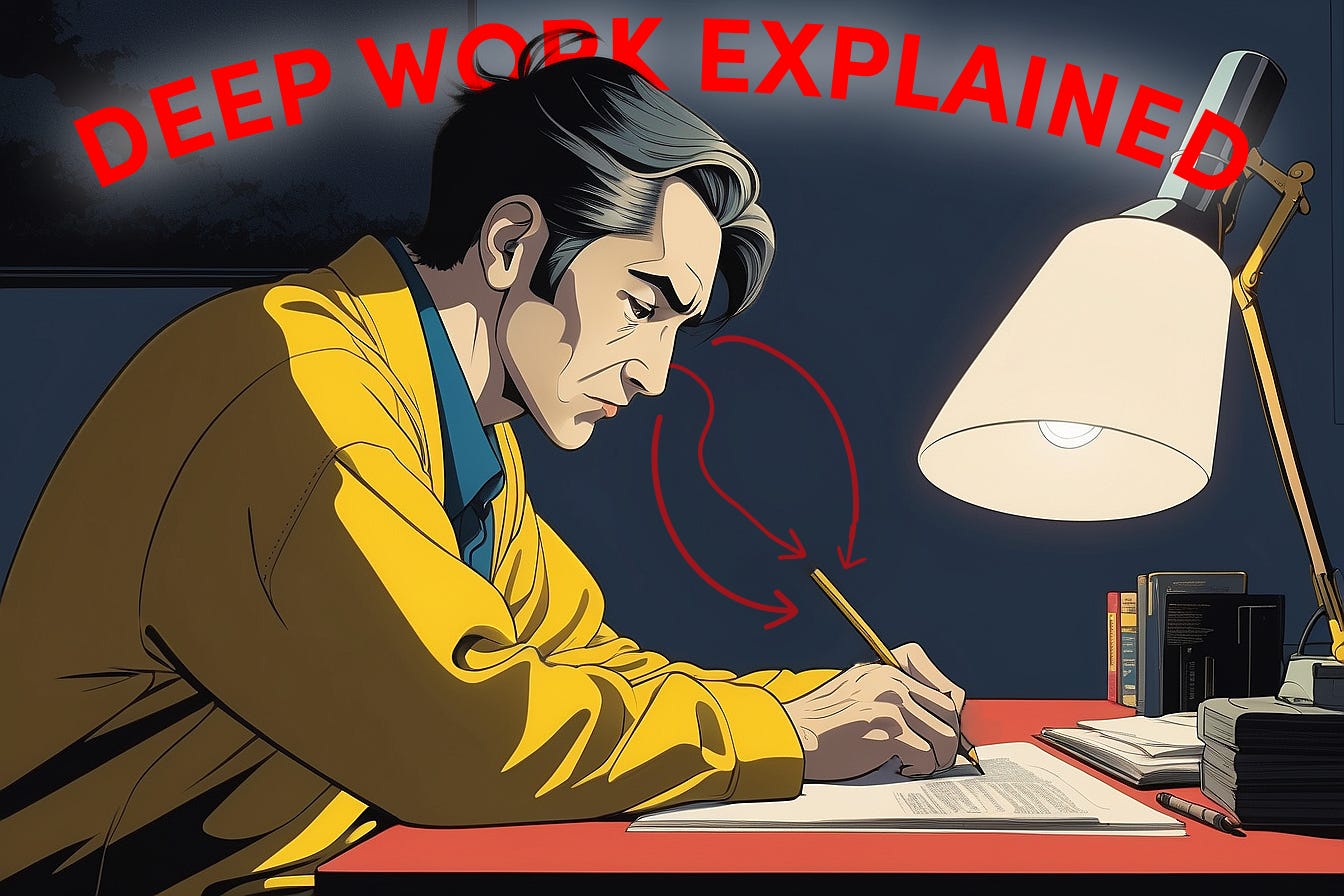Concept Crackdown: Deep Work
How to make your work deep work. 5 Core components to implement • Concept Crackdown #2
Deep work is a concept that instantly spoke to me. But, oh boy, I got it wrong.
I used to think deep work meant locking myself away like a monk and grinding for 8-hour stretches until my brain turned to mush.
I'd last maybe 45 minutes before my mind started wandering. I was doing the equivalent of trying to build muscle by lifting weights for 12 hours straight.
Everyone's optimizing their monk-mode setup with $300 noise-cancelling headphones. The most productive people I know can get work done in crowded cafes.
This post is my understanding of deep work. If you want the view of Cal Newport who popularized the term, read this Wisdom Hit:
In this Concept Crackdown:
What deep work actually is
Component 1: Preparation
Component 2: Attention
Component 3: Value creation
Component 4: Mental recovery
Summary bullet points
How to make your work deep work
Common mistakes to avoid
Best resources on deep work
What deep work actually is
In one sentence: The skill to focus without distraction on cognitively demanding tasks for sustained periods.
Working smarter by creating internal and external conditions where your brain can operate at its highest capacity.
Deep work isn't sitting at your desk longer. It's a skill. Like any skill, it requires practice, proper technique, and gradual progression.
Active meditation, as I like to think about it.
Note: Not all work is deep work. Not all work needs to be deep work. It's reserved for complex, challenging tasks that require high mental capacity. Not daily, repetitive activities.
Deep work is 4 main components working together:
Preparation. Attention. Value creation. Mental recovery.
Component 1: Preparation
First things first: you must know what to do in the session.
Before you start, you need a concrete plan with tangibly described tasks to cross out. A clear, paved path for your brain to follow.
Instead of:
Write the newsletter.
Make it:
Pick a topic from the saved list.
Come up with a title and subtitle.
Outline with short notes under each headline.
Write the intro and first section.
Complete the body paragraphs.
Proofread, edit.
Design thumbnail.
Clear instructions so you don't have to think about next steps. All your mental energy goes into execution.
Warmup
Your brain needs a signal that it's time to switch into deep work mode.
In creative work, it takes some time to get the engine running smoothly. When I write, I often have to sit for 40 minutes deleting and rewriting the intro over and over before things click and words start spilling out on my keyboard.
Mine is simple:
Close all browser tabs except the work document, timer, and task list.
Write what I specifically have to do, like above.
I also have a “focus indicator” on my desk.
The idea is to give your brain a visual representation of entering “work mode”. What I do is put the figurine on my desk and tap it 2 times on its head every time I am about to work. This is a kind of signal that the focus block just started.
From:
Action: Before your next deep work session, spend 5+ minutes writing down the exact steps you'll take. Be so specific that someone else could follow your plan and complete the task. Clear checkpoints, like in a video game.
Component 2: Attention
This is where most people completely miss the point.
Attention isn't binary. It's not focused or distracted. It's more like a muscle that gets stronger with training and weaker with abuse.
Common mistake: Switching attention mid-session. Even checking a single email interrupts the flow state. Quick notification check doesn't feel like it costs anything, but it's like throwing a small stone on the surface of water.
During the session, you work on one thing and one thing only. Obligatory rule, no exceptions.
Attention management means:
Single-tasking religiously: One task for a given time, hit F11 on your keyboard. Period.
Batch distractions: There’s time for shallow and deep work. Defend your deep work time like your paycheck depends on it (it does). Shallow tasks often consist of actions that take less than 15 minutes/each, which means switching attention before you get deep is necessary. Assign time for them, but never mix with deep work sessions.
Progressive overload: Mental gym is a cool little metaphor that I like. Depending on your level, but if you spend 2+ hours on TikTok daily, don't jump straight to 4-hour marathons.
Exercise vs supplementation: Deep work skill is exercise. Putting your phone in another room and distraction blockers is supplementation. Nothing will stop you from scrolling TikTok if you really want to do it.
Use when it’s here: I know many of you have exhausting 9-5’s. Best thing I can advise you here is to go to bed earlier and wake up an hour (minimum) before your normal schedule, and make it deep work time.
Be ruthless about protecting your attention during deep work hours. And I don’t have any magic trick here. It’s a damn hard habit to develop. I got something that will help you do so, though.
Environmental attention design (remember it’s only supplementation):
Use website blockers.
Phone in another room.
Noise-cancelling headphones.
Close unnecessary browser tabs.
Non alcoholic drink of your choice (with caffeine, preferably).
Clear your desk of everything except what you need for this specific task.
More here:
Action: For one week, track every time you switch tasks or check a distraction during work. Don't try to change anything yet, observe. Tape a sheet of paper on your desk (like one from my tracker) so you remember to log.
Component 3: Value creation
It's not about how many hours you log.
At the end of the day, all that matters is how much you got done. Busy doesn’t equal productive.
You can spend 8 hours and end up shocked by how little you have done. You can spend 18 minutes moving forward.
Drop the vanity metrics:
Hours logged.
Apps used.
Number of Pomodoro timers completed.
Focus on outputs:
Problems solved.
Words written.
Concepts learned.
Tasks completed (and what completion of those means).
The question isn't "How long did I work?" It's "What did I create?"
I recommend doing outputs summary every evening. Although I log my sessions, those are just numbers in Excel. What I do to realize is writing down what I’ve done today and what for.
Shallow work = necessary admin stuff, maintance.
Deep work = creating value, moving the needle.
Action: After your next deep work session, immediately write down what you completed.
Psst… Reedition of “Short Practical Guide to Mental Health” is now out! Real tools, tested in real struggles. You will not find vague advice or feel-good stuff. Just the exact methods I used to get out of my worst ruts.
If you want practical steps, reset protocols, social detox tools, and mental clarity without the jargon, this is for you.
📘 Grab your copy here — Make a gift to your future self!
Component 4: Mental recovery
Deep work is cognitively exhausting. Your brain, despite making up about 2% of total body weight, consumes about 20% of your body's energy.
Your brain continues processing information subconsciously during rest periods. Ever notice how solutions come to you in the shower or during walks? That's your default mode network connecting dots while your focused attention relaxes.
After sessions: Take downtime to consolidate what you learned/did, and restore mental energy. This is when insights form and problems solve themselves. Catching a breath while running is forced by body, letting the mind breathe is not, but as important. Take a nap, go for a walk.
Recovery day: Every 2 weeks plan at least one full day where you don't do any cognitively demanding work. I know you can, but that’s to avoid burnout.
Know when to stop
Quality over quantity. Correcting the mistakes of exhausted you is stupid self-sabotage. Trying to do deep work all day is like trying to sprint a marathon.
Don’t push when it’s time to rest. Staying up late when you must wake up at 6 am is not productive, it’s stupid.
Tired, you make mistakes that are harder to fix than to start over the next day.
You will have to get that energy back from somewhere. You will have to get that sleep anyway, but at different hours.
As I said before, deep work requires high mental capacity. Tiredness and distractions are enemies of it. Deep work performance is directly linked to sleep quality. If you are getting little of it, you are operating at reduced cognitive capacity. No amount of coffee can substitute for proper rest.
Summary points
Deep work is for cognitively demanding tasks.
Better to sleep 8 hours and get 2 hours of work done than sleep 6 hours and get 4 hours of work “done”.
Deep work requires your mind (therefore your body) to be well rested.
Optimal time: No more than 4h/day.
Session lenght: 90min.
Preparation time: 10 minutes of planning/90, not counted as the session.
Progress tracking: Write down specific output after every session.
Weekly quota: 20 hours of true deep work per week is truly elite-level productivity. Most people achieve 2-3 hours.
I know it’s a lot of info. If it all sounds terrifying, keep in mind that in the age of distraction, this skill is not a default anymore and more valuable than ever.
How to make your work deep work
In practical steps.







